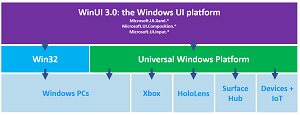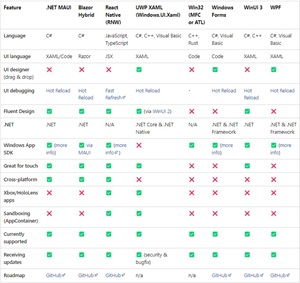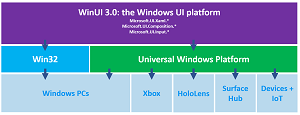Microsoft’s Shelved UWP Project Supports .NET 9 to Help WinUI 3 Migration — Visual Studio Magazine
News
Microsoft’s Stopped UWP Project Supports .NET 9 to Help WinUI 3 Migrate
Microsoft previews UWP (Universal Windows Platform) support for .NET 9, providing a way for existing UWP developers to update their devices with the latest .NET and Native AOT . This is being done as the company encourages devs to switch to Windows App SDK and WinUI 3 because UWP is no longer under active development.
“Are you a UWP developer thinking of moving to Windows App SDK and WinUI 3?” Microsoft’s Sergio Pedri, a senior software engineer, asked in a DevBlogs post today. “Or do you want to use the latest releases of .NET and Native AOT? Or maybe you’ve been struggling to find new versions of your favorite libraries, because they only include support for .NET 6 and up?” Well, look no further! The updated UWP support for .NET 9 provides a way for UWP apps to upgrade using the latest version of .NET.”
Instead of any new features or UWP functionality, the preview contains a bunch of updated tools and components that are part of .NET, Visual Studio, Windows SDK and more. They allow devs to use the latest version of .NET and C# for building UWP apps to update their apps with .NET 9 while considering moving to WinUI 3.

UWP was introduced in 2015 with Windows 10, which addresses Microsoft’s vision for a unified platform for all Windows devices (PCs, tablets, Xbox, IoT, HoloLens etc.). Various issues and issues halted the project and Microsoft released Windows UI libraries called WinUI 2, a UI framework for UWP, and WinUI 3, an evolution of WinUI that breaks the modern UI framework from on UWP, making it available for both UWP and traditional Win32 applications. (via Windows App SDK). Part of the impact of UWP development has been steady seems to be a shift on Microsoft’s part to focus on native Windows development, which is now possible in a surprising number of ways, including WinUI 3, Windows Forms, WPF, Xamarin, .NET.MAUI and more:

Microsoft stated that the main goals of UWP support for .NET 9 include:
- To provide a better migration path for UWP developers who want to migrate to WinUI 3. Instead of having to do the entire migration in one step (which means both updating the entire .NET runtime as well as the entire UI design and app model), UWP support for .NET 9 is provide an incremental approach to WinUI 3.
- Enabling developers to remove dependencies on .NET Native, so they can benefit from the latest .NET and C# features, regardless of their app version. If you’re currently looking at UWP because you can’t migrate to Windows App SDK and WinUI 3 for some reason (perhaps because Windows App SDK doesn’t support important APIs, or because you don’t have the tools to fully migrate. ) , we still want to allow compatibility with all other Windows UI designs. This update reduces the friction for UWP developers when trying to update legacy apps using older libraries from the environment.
“Whether you’re moving from UWP to WinUI 3, or just trying to make the most of your device’s existing UI design, this preview helps you upgrade to .NET and the latest C# and use the latest hardware updates to make it easier.” your migration,” Pedri said.
The extensive post goes on to explain how to get started, creating a UWP .NET 9 project, project details and much more. In terms of what’s next, the XAML developer in Visual Studio is in the works, along with MSTest adding UWP support for .NET 9, WinUI 2, support, upcoming support for the Windows Community toolkit and more.
One note from Pedri: “As we said in the introduction, UWP support for .NET 9 is available in preview, so expect some tweaks as we work to improve the developer experience! We hope that eventually, this will become the preferred way for UWP apps to use .NET and C#, and that as many developers as possible will be able to upgrade their existing UWP apps from .NET Native to latest .NET and Native AOT.”
About the Author
David Ramel is an editor and writer for Converge360.
#Microsofts #Shelved #UWP #Project #Supports #.NET #WinUI #Migration #Visual #Studio #Magazine
